What are sleep stages or sleep cycles?
Before we fully dive into REM sleep, we need to fully understand what happens once we fall asleep. We'll be using NIH as our source, and briefly go over what is what.
What is Non-REM sleep?
As we've mentioned in the intro, non-rem sleep is the sleep stage when our body “relaxes”. To be more precise, your body temperature drops, your muscles ease up, and your body starts repairing muscle and bone tissue. And if you're into bodybuilding or fitness in general, this is the sleep cycle when muscle growth is initiated (to a degree)!
- Stage 1 or N1: Stage one is generally known as light sleep and it covers the transition from wakefulness to sleep. It's also the stage of sleep where you're most easily woken up.
- Stage 2 or N2: Stage two starts right after stage one and is the bridge between light sleep and deep sleep.
- Stage 3 or N3: Stage three is known as deep sleep (or slow-wave sleep) and is the phase where your body properly rests. It's also a lot more difficult to wake you up at this point of the sleep cycle.
Non-REM sleep also constitutes about 75-80% of our total sleep. And not getting enough non-REM sleep will typically result in physical fatigue, slowed down muscle growth, and possibly the development of some sleep disorders. However, since it encompasses such a large percentage of sleep, it's fairly easy to assess whether you're getting enough non-REM sleep.
What is REM sleep?
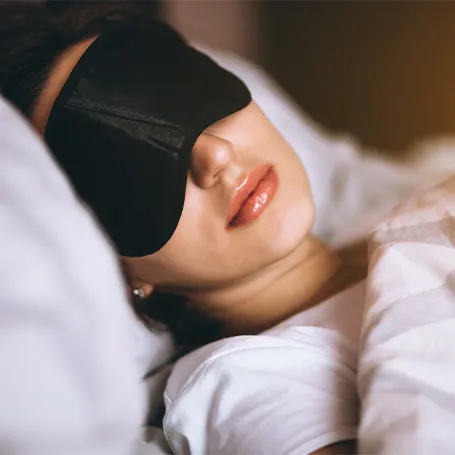
Now for the main belle of the bawl – REM sleep! REM or rapid eye movement sleep occurs after non-REM sleep and it's when a few interesting things happen.
For one, this is when muscle paralysis sets in. And while that might sound like a bad thing – it's quite the opposite.
In essence, your body “locks out” so that you don't end up reenacting your dreams. In fact, when these “locks” aren't put into place, you often develop sleep disorders known as REM sleep behavioural disorders.
For example, this is when you'd laugh in your sleep, talk about things that aren't there, or even start moving around.
Secondly, as the name would imply, the REM stage has your eyes rapidly moving in all directions.
And this is also the sleep stage where your mind “rests” and neural networks in your brain are solidified.
What does one full sleep cycle look like?
Now that we know the steps your body goes through after falling asleep, let's put it all together. So, here's what a typical sleep cycle would look like:
- Falling asleep – According to the Sleep Foundation, it typically takes around 15 to 20 minutes to enter light sleep. However, this can vary quite a bit and especially sleepless nights could have you awake for an hour or more.
- Stage 1/ Light sleep – Light sleep will typically last only a few minutes. During this phase, you can potentially experience some sleep disorders such as Exploding Head Syndrome.
- Stage 2 – In some sleep trackers, stage 2 sleep will also be categorised as light sleep, since it bridges the gap to deep sleep. It typically lasts around 10 minutes.
- Stage 3 – Deep sleep lasts the longest when compared to other NREM stages – at around 30-40 minutes.
- REM sleep – The amount of rem sleep can vary quite significantly, from as little as 10 minutes and even up to an hour. However, it should typically account for about 20% of your sleep cycle.
- Repeat – The entire sleep cycle lasts around 90 minutes (averaging out). The first few will be a bit longer and then they'll get shorter the more you sleep.
From this point on, your body goes through as many sleep cycles as it can/you allow it. Without an alarm, you're the most likely to wake up during light sleep. This is typically the best outcome as being woken up from REM or deep sleep will usually make you feel more groggy.
How much REM sleep do you need?
Now that we know how important both REM and NREM sleep are, it's natural to have questions. For example, how much deep sleep do you need? Or how much REM sleep do you need? Well, the answer to this question is rather simple in theory but can be a bit more difficult in practice.
The fact of the matter is that since sleep is broken into consistent cycles, there isn't anything you could do in order to get more deep sleep or more REM sleep. You just need to get enough sleep in general! And if you're not sure whether you're getting enough sleep, we recommend going to our page and doing the sleep calculator test. This is because the amount of sleep you need does differ depending on your age.
It can also help to get a good sleep tracker so that you know exactly how much sleep you're really getting. Some models even track REM sleep in particular.
But as a general rule of thumb, you want about 20% of your sleeping time to be spent in REM sleep. So, just get enough sleep in general and make sure not to do anything that can lead to you getting lower-quality sleep. After all, while there isn't anything that helps you get more REM sleep, there are a few sleep habits and conditions that can make you get less REM sleep.
Why is REM sleep important?
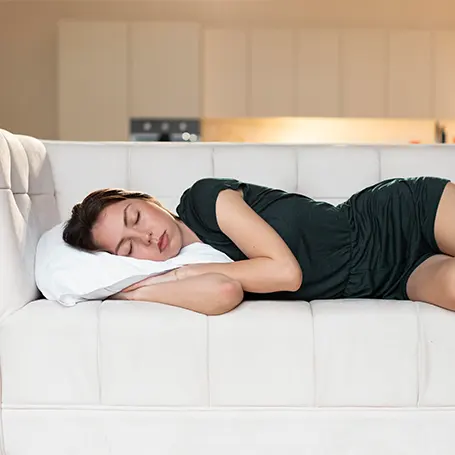
Now that we've answered the questions of when REM sleep occurs and what all the sleep stages are, let's talk about the consequences.
Sleep deprivation can in general lead to a lot of adverse health conditions, that can range from heightened odds of obesity to even cardiovascular disease.
But what about REM sleep deprivation?
Well, as we've mentioned REM sleep is for the mind what deep sleep is for the body. In other words, it's when your brain gets to process new information, solidify memories, and even learn muscle patterns.
And it's even more important for infants as it's when their central nervous system is the most active and encompasses mature brain development.
So, whether you're an infant, adolescent, or senior, getting enough sleep is rather important. And to further drive that point home, let's talk about a few of the consequences that can occur due to REM sleep deprivation.
What happens during REM sleep?
If the previous section seemed a bit too vague, don't worry, we've got you! We generally like to think of three main processes that occur during REM sleep (but they're not the only ones):
- Dreaming – Dreams might sound rather inconsequential but they're actually quite important. This is because dreams help our brain process certain emotions. And, for some people, the process of lucid dreaming that takes place during REM sleep is also quite important.
- Memory storage – During REM sleep, our brain also “goes over” our memories, deciding which ones to hold on to and which ones to let go. This is why it's often said that sleeping before an exam is going to help you more than pulling an all-nighter and studying.
- Brain development – Sleep research has noted that infants and babies spend most of their sleep time in REM sleep. This has given rise to the hypothesis that REM sleep is essential for brain development. Given how much activity is seen in a “sleeping brain”, this seems like a likely outcome.
What happens if you don't get enough REM sleep?
When it comes to REM sleep deprivation, some conditions are more apparent than others. For example, heightened risk of obesity, brain fog or irritability, and migraines. And while the latter two might seem pretty obvious, obesity seems slightly out of place.
Well, new research suggests that not getting enough REM sleep leads to overstimulation in certain parts of the brain that can leave the individual feeling extremely hungry. And the problem here is that sleep and obesity have a two-way relationship, meaning that just as bad sleep can lead to obesity, obesity can then stop you from getting a good night's sleep. Not to mention conditions that can also pop up along the way such as obstructive sleep apnea.
In fact, the same research paper even suggests that chronic sleep deprivation might just be fatal. So, getting more REM sleep isn't just about improving your mood but also keeping your body healthy and running!
What affects REM sleep?
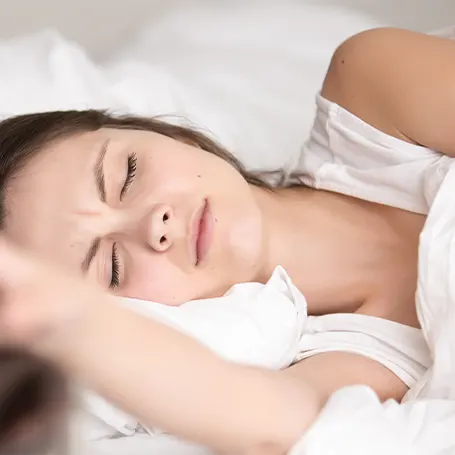
Now that we know what REM sleep is and why it's important, let's start talking about how you can get more REM sleep.
So, let's first see what could be holding you back.
The most obvious culprit is a lack of adequate sleep in general. After all, if REM sleep account for 20% of total sleep and your sleep duration is only around 4 hours a night, you're probably not getting enough REM sleep (or sleep in general).
However, there are also factors that affect your REM cycles specifically.
So, let's quickly go over the many lifestyle or medical factors that can be shortening your REM sleep cycle. And do note, while some of these can be fixed with simple lifestyle changes, others will need the intervention of a medical professional.
So, we strongly urge you to go to a sleep clinic if something outside of your control is shortening your REM sleep.
Alcohol
It can sometimes be hard to figure out exactly how alcohol affects sleep. After all, when you've had a bit more to drink, you can sometimes fall asleep in seconds and stay asleep far longer than you would normally. But is it healthy sleep? Well, no.
Plenty of sleep research has shown that alcohol affects our sleep patterns and leads to less REM sleep. In fact, these drunken naps seem to prefer light sleep in general, as deep sleep occurs less frequently as well. And if you've been paying attention, you'd know that this means that both your body and mind aren't getting the rest they need.
Medication
Depending on what medication you're using, your REM sleep could also be suffering. Specifically, some antidepressants can potentially cause less REM sleep overall. However, unlike the previous segment, medication usage isn't something we can change on a whim and different types of medications can affect people in different ways.
So, it's always best to consult your GP or have a sleep study done, as tracking your sleep cycles and measuring your brain waves is a lot more precise than just blanket statements and trends. Generally speaking, the following types of medications are the most likely to cause less time in the REM phase:
- Cold and allergy medications – These medications can oftentimes result in higher blood pressure and heart palpitations. This in turn can lead to less deep sleep or a shorter sleep duration in general.
- Diabetes medication – While diabetes and sleep have a negative connection already, via sleep apnea and related factors, diabetes medication can also cause some harm. Namely, it can lead to nightmares and/or similar nighttime disturbances.
- Anxiety medication – Just like in the previous example, this can feel like a lose-lose situation. Anxiety by itself can hamper sleep. However, some anxiety medications can directly suppress REM sleep. For this reason, it could be a good idea to try to calm your anxiety at night via other means or consult your GP for alternatives.
These are just some of the medications that can affect sleep. As you might have noticed, they're not always something you'd expect and can in some cases even seem counter-productive. This is why dealing with sleep disorders can be rather difficult without the help of a professional.
Lifestyle choices
Lastly, we want to discuss a few lifestyle choices that can also lower your overall sleep duration. However, we do want to clarify that even though we're calling them lifestyle choices, some of these habits are difficult to change on your own. So, seek professional help if needed.
Drinking alcohol
While a lot of people like to take a nightcap in order to fall asleep, alcohol is anything but beneficial for sleep quality. Alcohol affects sleep quality in a very negative way and can often lead to less deep and REM sleep overall. Of course, this is mostly the case when drinking a larger amount of alcohol in a single sitting.
Certain foods
Knowing what to eat before bed can be a bit tricky as certain foods can lead to a higher sleep latency. This means that it can take a longer time to fall asleep. On top of that, certain foods can also make it more likely that you'll wake up frequently during the night, thus making it more difficult to have consistent sleep cycles.
Caffeine
By this point, most people know that drinking coffee before bed can keep you up for quite some time. However, this goes for any drink that contains caffeine. So, even certain teas (like black teas) can produce a similar effect. As a general rule of thumb, you want at least a six-hour window between your last caffeinated beverage and your bedtime.
Drugs and smoking
Drugs can often lead to poor sleep quality and frequent nighttime disturbances. This is especially true for very addictive drugs, as you can start to experience withdrawal symptoms while trying to fall asleep or even during the night. A similar principle applies to nicotine, especially among people who smoke one or more packs a day. On top of that, things such as throat irritation, the poignant smell of cigarettes, and a large amount of smoke in the room can make falling asleep quite difficult.
Sleep disorders
Sleep disorders by design lower your overall sleep quality and duration. So, it's not a stretch to say that they lower your REM sleep as well. When it tackling a sleep disorder, the methods can vary quite a bit. Some sleep disorders can be dealt with by making lifestyle changes or getting certain medications while others require much longer and specialised procedures.
But regardless of which kind of sleep disorder you might be dealing with, it's always best to consult your GP and even get a sleep study done. This is because quite a few sleep disorders can seem similar at a glance while requiring different treatments. So, note that the following section is just for educational purposes and doesn't substitute a trip to the doctor.
Sleep apnea
Both obstructive and central sleep apnea can result in frequent nighttime disturbances, making it difficult to get consistent sleep. Obstructive sleep apnea can be especially worrisome as the person affected can sound like they're choking.
So, if you or your loved one exhibit very loud snoring or sound like you're choking at night, getting a sleep apnea test could be the right move. In terms of treatment, you'll likely be advised to use a CPAP machine and make certain lifestyle changes, like sleeping on your back or losing weight.
Nightmare disorder
Since dreams frequently take place in the REM sleep phase, nightmares are also on the menu. And while there's nothing wrong with having a nightmare from time to time, excessively frequent nightmares could be a sign of nightmare disorder. When it comes to avoiding these nightmares, certain lifestyle changes can help (like reducing stress) however, seeing a professional is highly advised. After all, this is a proper sleep disorder and not just a string of bad luck with nightmares.
Insomnia
Insomnia is one of the most well-known sleep disorders, however, that doesn't mean that treating insomnia is any easier than with other sleep disorders. And since insomnia directly lowers your overall sleep duration, even leading to sleep deprivation, it's an obvious concern for your REM sleep.
When it comes to treatment, options can vary far and wide. This is because insomnia can just be a sign of a different underlying condition. In these cases, said condition needs to be dealt with first. However, other times, it's just a temporary issue that can be fixed by bettering your sleep hygiene.
REM sleep behaviour disorder
We know that when REM sleep occurs, your experience muscle paralysis. This is so that you don't start punching your partner every time you have a nightmare. However, people suffering from REM sleep behaviour disorder often don't have muscle paralysis even when in REM sleep.
This is why they can actually end up acting out their dreams. And it's important to note that this is distinct from sleepwalking. Most of the time, this disorder will just have the person talking in their sleep and maybe moving around in bed. However, there's also a legitimate risk of hurting yourself or others. So, seek out a professional if you think you might be affected by this disorder.
How to get enough REM sleep?
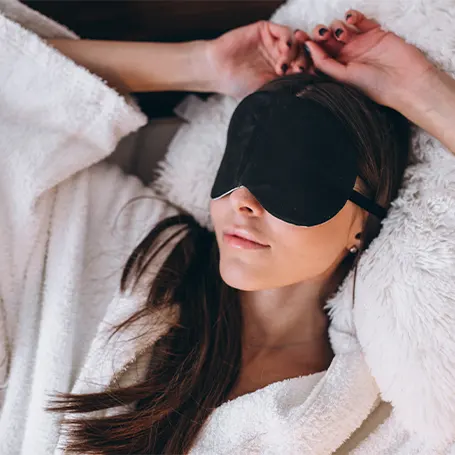
So, in the end, how do you get enough REM sleep? Well, that's rather easy – just get enough sleep in general and avoid all of the things that can lessen your REM sleep duration. So, let's talk about how you can improve your sleep in general.
And if you have any tricks of your own, make sure to leave them in the comments!
Good sleep habits
Certain habits are extremely helpful when it comes to prolonging your sleep duration and improving your sleep quality. For example, having a consistent bedtime routine. Be it 10 minutes of meditation, light stretches, or listening to a chapter of your favourite audiobook, rituals can help ease anxiety at night.
And by going to sleep and waking up at the same time every day, you help your circadian clock stay on track. This means that falling asleep naturally will become easier and you might even find that you start waking up without an alarm clock – which is quite a bit plus!
And we could keep going on and on. All of these practices fall under the term of proper sleep hygiene and it's something we've written countless articles about. So, just stick with The Sleep Advisors and you'll know what's what!
Tracking your sleep quality
While this is by no means something everyone needs to do, it does give you some interesting insight. This is because having a good sleep tracker means you can keep track of your sleep stages and see whether anything needs extra attention. After all, it can be difficult to gauge whether you're getting enough REM sleep by yourself as there are many other conditions that can also lead to brain fog or migraines!
However, the safest option here is to see a professional and have a sleep study done. This is especially true if you think you might have a sleep disorder or that your immune system is acting up in weird ways. After all, understanding sleep is incredibly complex, so, it's always best to have a professional on hand.
But if it's not too serious and you just want a device that will tell you approximately how much sleep you need and/or whether you woke up in the middle of the night, a tracker could be a good option.
Conclusion
So, in conclusion, how much REM sleep do you need? Just get the recommended sleep duration for your age (typically 7-9 hours) and avoid doing things that will shorten your REM sleep cycle and you should be fine. But if there's anything you think we've missed about REM sleep, let us know down in the comments.

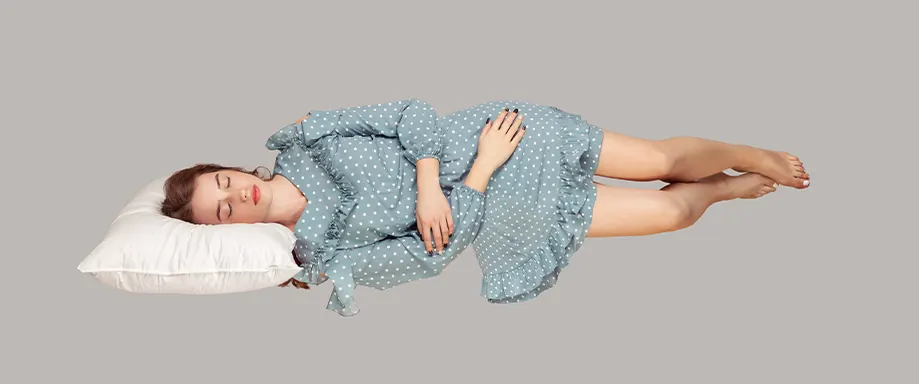











There are no comments yet
"*" indicates required fields